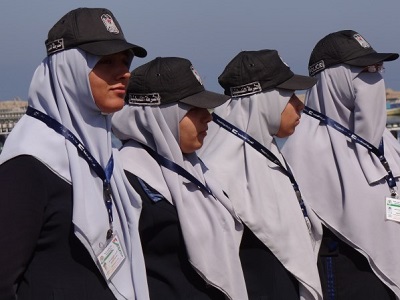
By Julie Webb-Pullman
The Gaza Strip is facing a humanitarian crisis, with such a critical shortage of gasoline that police have been ordered to transport students and workers to schools, universities and workplaces, the local Ministry of the Interior reported.
Police authorities took the drastic measure last Tuesday to alleviate the crisis that has arisen in the fuel sector since the closure of the tunnels that formed the only lifeline to bring basic necessities into the enclave, in defiance of the illegal – and crippling – Israeli siege of Gaza.
Students and workers have faced waits of several hours for public transport, or been completely unable to attend, bringing the region to a virtual standstill.
They are not the only ones affected. At its weekly meeting on Tuesday, the Gaza Council of Ministers called for international action to avert the growing humanitarian crisis caused by the severe impact of the closures on the health sector. Generators are unable to operate because of the fuel shortage, limiting the provision of critical services in clinics and hospitals, while some 30% of essential medicines and supplies are completely unavailable, and more than 500 patients cannot leave through Egypt to get urgent medical treatment.
While Egyptian authorities have agreed to open the Rafah Crossing on Wednesday and Thursday for four hours each day for ‘emergency cases only’ this will barely make a dent in the 500+ patients, let alone the 5,000 humanitarian cases, students, business people, and workers already waiting to cross, some for several weeks, if not months.
Whilst the Egyptian closure of the Rafah Crossing and the tunnels has exacerbated the existing situation, the fundamental issue to be tackled is the illegal Israeli siege of Gaza, strengthened to strangling point in 2006.
In its 2012 Annual Report released in March 2013, The Palestinian Centre for Human Rights (PCHR) lamented the fact that the Israeli siege has become institutionalized, and risks becoming legitimized by the international community, even if inadvertently.
“… [Israel’s] systematic policies have consistently violated the right to an adequate standard of living, the right to adequate housing, education, and social security, and the right to the highest attainable standard of mental and physical health,” PCHR said then.
“The crisis can be ended only with the immediate lifting of the closure, the removal of the restrictions on movement to and from the Gaza Strip, and the reversal of the ban on exports.”
How much truer that is now, with Egypt’s closure of the Rafah Crossing, and the tunnels that provided the only relief.
In this, the week marking 31 years since the Sabra and Shatila massacres, the international community, particularly the High Contracting Parties to the Fourth Geneva Convention Relative to the Protection of Civilian Persons in Time of War, must heed the cries from Gaza, and exert effective pressure on Israel, as well as on Egypt, to prevent further unnecessary, indefensible, and reprehensible Palestinian suffering and loss of life.
– Julie Webb-Pullman is a freelance journalist from New Zealand who has been living in and writing from Gaza since 2011. She contributes to SCOOP Independent News, Palestine Chronicle, and other online news sites.





As I watch the closing of the Rafah gate and destruction of the tunnels,I wonder how it is that madmen have the power to decimate , to squeeze life out of people living in a ghetto of despair as the world watches, remains silent and complicit of the crimes of the Israeli government and their Egyptian military henchmen.